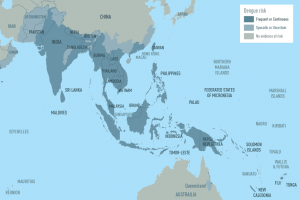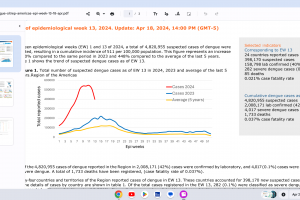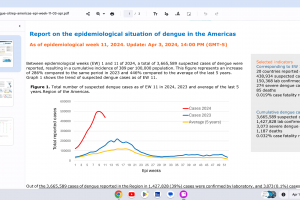Cancun Travel Vaccines
Cancun, Mexico Travel Vaccines 2024
When visiting Cancun, Mexico, health organizations suggest discussing vaccine options with a healthcare provider. As of 2024, Australia, Canada, Ireland, and the United Kingdom have published travel vaccine advice for Mexico's Yucatán Peninsula. As of January 2024, the U.S. Centers for Disease Control and Prevention (CDC) suggests reviewing specific recommendations for unvaccinated travelers before visiting Cancun and Quintana Roo.
Chikungunya: Chikungunya virus (CHIKV) has been reported in Mexico since 2014.
Dengue: Dengue virus is endemic throughout Mexico. The Pan American Health Organization (PAHO) confirmed in December 2023 that dengue poses a high risk to the Region. Dengue fever infections are a health risk in 28 of 32 states in Mexico in 2023. Mexico's Health Ministry and the PAHO reported over 235,000 dengue cases, 1,200 severe dengue cases, and 132 deaths (CFR: 0.056%) in 2023. The cases registered in 2023 are about 300 times more significant compared to the same period in 2022 and 58% higher compared to the average of the last five years. As many as one in five dengue fever deaths in the Americas occur in Mexico, and the rate of the disease's severity has been increasing for decades, according to the WHO. In the Central American Isthmus subregion and Mexico, all four dengue virus serotypes (DENV1, DENV2, DENV3, and DENV4) circulate in 2023. Quintana Roo (Cancun) is the leading state reporting cases in 2023.
Fungal Infections - U.S. residents returning from Matamoros, Mexico, were diagnosed with fungal meningitis infections that have led to severe illness and death. The CDC issued a Level 2 - Practice Enhanced Precautions notice to notify travelers.
Malaria: Malaria risk is intermittent throughout the year. In November 2023, the Mexican state of Quintana Roo was awarded the 2023 PAHO Malaria Champions of the Americas for their sustained actions towards malaria elimination in the Region. Health authorities in Mexico reported a small malaria outbreak in Oaxaca in December 2022. Twenty-eight malaria cases have been reported in the town of San Pedro Tapanatepec. This is the first malaria outbreak in Oaxaca in the past ten years. The Oaxaca Health Secretariat issued an epidemiological alert for an outbreak of Malaria. The U.S. CDC recommends that travelers to certain areas of Mexico take prescription medicine to prevent Malaria.
Measles: Infants visiting Mexico should get one dose of an MMR vaccine before travel.
Rabies: The state of Oaxaca reported four human rabies cases resulting from bat bites.in December 2022.
Rocky Mountain spotted fever: The U.S. CDC is issuing this Health Alert Network Health Advisory about an outbreak of Rocky Mountain spotted fever (RMSF) among people in the United States with recent travel to or residence in Tecate, Baja California, Mexico. RMSF is endemic in multiple border states in northern Mexico, including but not exclusive to Baja California, Sonora, Chihuahua, Coahuila, and Nuevo León. RMSF is a rapidly progressive disease and, without early administration of doxycycline, can be fatal within days.
Typhoid: Vaccination is recommended for most travelers, especially those staying with friends or relatives or visiting smaller cities or rural areas. In 2017, the state of Yucatan reported an outbreak. In Mexico, the last major S Typhi outbreak (10k) occurred in the 1970s.
Zika: Zika is a risk in Mexico. The PAHO reports that Zika virus infections are a health risk when visiting Mexico in 2023. As of October 2023, there are no approved Zika vaccines. Women who are pregnant or trying to become pregnant and their sex partners should be aware of the most recent CDC travel recommendations.
Cancun Pan American Health Organization
The Health in the Americas country profile for Mexico is based on interagency indicators, with the latest travel vaccine news posted at this link. For example, the Mexico IHR National Focal Point informed the Pan American Health Organization about the detection of a cluster of aseptic meningitis cases and related fatalities of unknown etiology in 2022, all with a history of having undergone surgical procedures with the administration of spinal anesthesia in private hospitals in the city of Durango, Durango State, Mexico. As of February 2023, about 79 meningitis cases were confirmed over the past few months. The World Health Organization publishes general precautions regarding infection prevention in the publication of PAHO/WHO international travel.
Mexico Travel Advisories
As of December 2023, the U.K. Foreign, Commonwealth, and Development Office advised against all but essential travel to the states of Chihuahua, Sinaloa, Zacatecas, Tamaulipas, and others. As of August 22, 2023, the U.S. Department of State stated violent crime is widespread in Mexico, and the U.S. government has limited ability to provide emergency services to U.S. citizens in many areas of Mexico. The U.S. Embassy for Cancun has issued related notices and suggests enrolling in the Smart Traveler Program to receive travel alerts during an emergency. The Canadian government says to exercise high caution when visiting Mexico due to increased criminal activity and kidnapping levels. The Mexican government provides information on emergency services and tourist assistance via the app and website.
Cancun Tourist Information (Sponsored)
Cancún is located on the Yucatán Peninsula bordering the Caribbean Sea and the Gulf of Mexico, best known for its beaches. Cancun comprises the downtown area, El Centro, and Zona Hotelera. The size of Quintana Roo includes Playa del Carmen, Tulum, and Cozumel.
Various organizations offer travel advice when planning a visit to Cancun in 2023.





